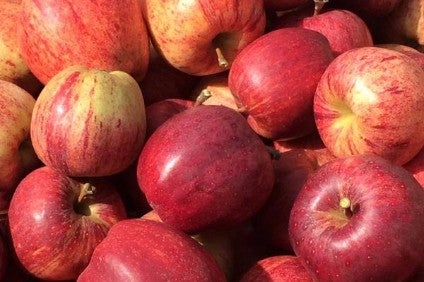
Apple and pear growers in the UK are “counting down to catastrophe” without a seasonal labour deal emerging from the Brexit negotiations by September 2018, six months before the country’s scheduled formal departure from the EU, an industry body has warned.
Lincolnshire-based English Apples and Pears commissioned an independent study into the post-Brexit labour requirements of the industry from planning specialist Andersons Midlands. The report argues it is “imperative” a seasonal agricultural workers scheme is put in place by September 2018, in time for the 2019 season “to prevent the potential collapse of the UK orchard fruit sector”.

Discover B2B Marketing That Performs
Combine business intelligence and editorial excellence to reach engaged professionals across 36 leading media platforms.
Steven Munday, English Apples and Pears’ chief executive, said the sector could not wait until March 2019, when the UK is lined up to leave the EU.
“The 2019 crop – and, with it, the future of the industry – is at stake,” Munday said. “Until now, the vast majority of our labour has come from Europe, but there are currently no post-Brexit guarantees that this will continue. It is no use waiting until March 2019 when we leave the EU to see what happens. We have to organise our workforce about a year in advance, so September 2018 is the deadline for a seasonal workers scheme to be in place. Without this, the consequences for growers, consumers and the environment will be devastating.”
The UK needs around 10,300 seasonal workers each year to manage and harvest an orchard-grown fruit crop of 300,000 tonnes, worth GBP181.3m (US$238.4m), according to the report.
According to the study, about 30% of UK demand for orchard fruits – apples, pears, plums, cherries, peaches, nectarines and apricots – is met with fruit grown domestically.

US Tariffs are shifting - will you react or anticipate?
Don’t let policy changes catch you off guard. Stay proactive with real-time data and expert analysis.
By GlobalDataIt warns the loss of this volume would increase imports, potentially raise prices, and add to environmental costs. The report notes growers face “insurmountable difficulties” in recruiting UK workers in rural areas, with only a small fraction of the seasonal labour force provided by UK nationals. By far the majority come from the European Union.
Andersons Midlands reports labour accounts for up to 50% of the costs of production for growers and concludes that having continued access to a competitive labour market is essential for the continuing prosperity and growth of UK orchard fruits.
Munday added: “UK orchard fruit is a success story. Volumes grown here are up by 27% since 1997 and we’re predicting more growth for the future. In fact, we’ll need 11,500 workers by 2021. All of this is now in jeopardy unless the labour situation is resolved. We are counting down to catastrophe.”
English Apples and Pears said growers were “sceptical” seasonal labour could be filled by UK nationals, while they predict it is “unlikely” robotic harvesting would be widely available commercially “within five years”.
Against that backdrop, the organisation predicts a decline in production and increasing imports.
In July, the UK government commissioned the Migration Advisory Committee (MAC) to examine the role EU nationals play in the UK economy and society, including their role as seasonal workers.
In July, when the commission was announced, UK Home Secretary Amber Rudd said: “Leaving the European Union gives us the opportunity to take control of immigration from the EU. We will ensure we continue to attract those who benefit us economically, socially and culturally.
“But, at the same time, our new immigration system will give us control of the volume of people coming here – giving the public confidence we are applying our own rules on who we want to come to the UK and helping us to bring down net migration to sustainable levels.”
Rudd also stressed there would be an implementation period when the UK leaves the EU to ensure there is no ‘cliff edge’ for employers or EU nationals in the UK.
In addition to the MAC commission, it was announced there will be an “extensive” cross-government programme of engagement over the coming months with stakeholders from a number of sectors, including business, industry, trades unions and educational institutions.
When UK Prime Minister Theresa May was Home Secretary, a previous seasonal agricultural workers scheme was scrapped in 2013.
In the House of Commons yesterday, May, who was giving MPs an update on last week’s meeting with her EU counterparts at the European Council, was asked by Conservative MP Dr Sarah Wollaston if she would be willing to reinstate the seasonal agricultural workers scheme.
May said: “I was Home Secretary when the scheme ended, and at that stage the Migration Advisory Committee made it clear that it felt it was not necessary to reintroduce it, at least for a period of time. However, the current Home Secretary has asked the committee to look into immigration needs throughout the UK economy. I am sure that that will include consideration of the sector that [Wollaston] has spoken about, and of whether or not a seasonal agricultural workers scheme is necessary.”
How do you see Brexit affecting your business? Give us your view on that and many of the other hot issues facing the sector in our 2018 Confidence Survey.





